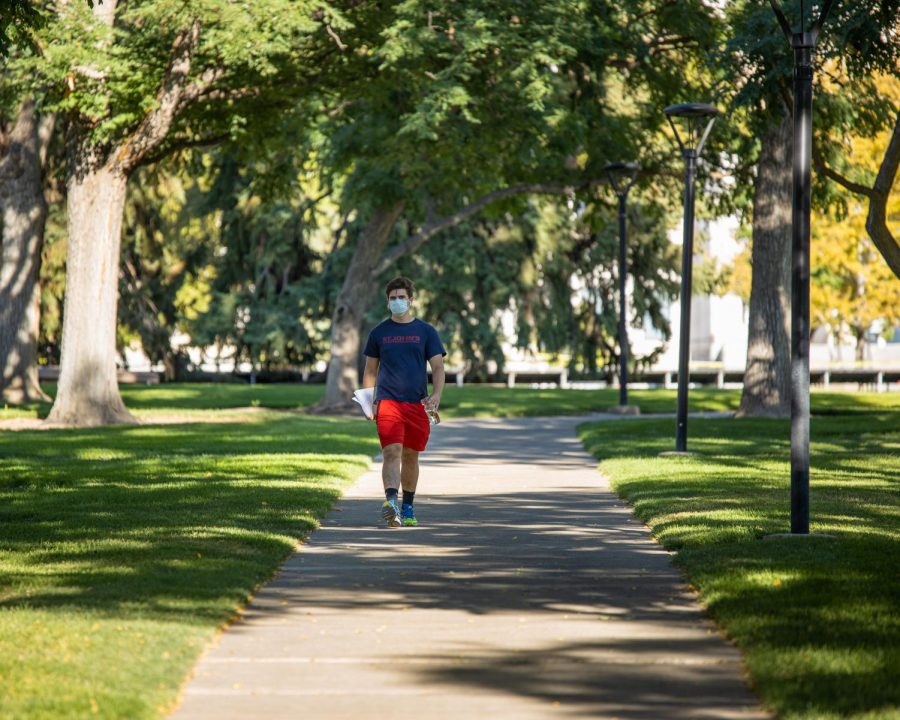Students at the University of Utah are following the COVID-19 guidelines by wearing masks while working on campus. (Photo by Abu Asib | The Daily Utah Chronicle)
The COVID-19 pandemic isn’t over. The virus’ variants still pervade the country. The CDC shows that the United States currently experiences high levels of transmission. This is especially concerning as roughly 10 million people in the U.S. are immunocompromised.
Many continue living in fear of the virus’ effects and have yet to experience a return to normal. It’s a privilege to be unaffected by the current strains of the virus, yet our education practices assume everyone has this privilege.
Our continued neglect of the immunocompromised population during the remainder of the pandemic is ableist. Universities, including the University of Utah, should reevaluate status quo COVID-19 policies to support the immunocompromised population.
UC Berkeley is the home of the disability rights movement. Ed Roberts, paralyzed by polio, was “the first severely disabled student at UC Berkeley.” He started his education there in 1962 after an initial rejection. In 1972, he went on to help found the Center for Independent Living.
Headquartered at Berkeley, this now-community organization sought to make academic and social life on campus fully accessible. The CIL also participated in a month-long occupation of a San Francisco federal court house in April 1977.
Judith Heumann, another disability rights advocate, founded the CIL and the World Institute on Disability alongside Roberts. Appointed by President Obama, Heumann became the first Special Advisor for International Disability Rights at the U.S. Department of State. More recently, a Netflix documentary called “Crip Camp” featured Heumann as a guest.
However, UC Berkeley’s actions this year don’t allude to this rich history in the disability rights movement. UC Berkeley resumed “in-person instruction on a large scale” this fall. They currently offer roughly 600 fully online courses compared to the 6,000 courses offered in-person.
But this pattern of returning to normal isn’t exclusive to UC Berkeley. The University of Nebraska-Lincoln also brought students back to campus while people remain worried about the continued impacts of COVID-19. Most of my friends at schools across the country have most of their classes and activities in-person as opposed to online.
The lack of online course options means that students must choose between their health and education. No one should ever have to decide between these two valuable necessities. Nearly one in four people who got COVID-19 and didn’t require hospitalization developed long-term effects. People still struggle with COVID-19’s impacts alongside the current rising numbers.
Even though Berkeley claims to provide accommodations, the requirements to obtain them say otherwise. A “high risk disabled, low income student” at Berkeley described the current plan for Disabled Students Program. One of these requirements included “a medical letter stating you’re in the extremely narrowly defined category of ‘immunocompromised.’”
This requirement emphasizes the expectation to “prove” a disability. This proof puts undue pressure on disabled individuals while making the community exclusive.
And this issue of ableism hits close to home. As the U prioritizes in-person classes, they also disenfranchise immunocompromised students by extension. As Utah continues to report a high number of cases, immunocompromised individuals have a legitimate cause for worry.
Because many immunocompromised individuals cannot feasibly return to normal right now, we still need to have support in place. Teachers should offer online options for their course or consider teaching a fully remote section. This allows immunocompromised students the ability to remain safe and to take the classes needed for their area of study. Teachers should better understand attendance variance as COVID-19 infection rates continue to change throughout the state.
I’m fortunate enough to take most of my classes within the disability studies and special education departments. Because of the nature of these classes, many of my professors have helped accommodate students and have shown awareness of the perils of the ongoing pandemic. I recognize my privilege in being able to attend in-person classes without much worry about COVID-19. However, many are disadvantaged by the current “return to normal” attitude in our institutions of higher education.
These disparities require change. We need to adjust our mindset about the pandemic. We must support and advocate for immunocompromised individuals as the pandemic persists. As we advocate for the immunocompromised, we can make real change. To create a more equitable society, we all must look to leveling the playing ground in public health and public education.
"current" - Google News
September 16, 2021 at 06:19AM
https://ift.tt/2Xyqe4m
Kincart: Current University COVID-19 Policies are Ableist – The Daily Utah Chronicle - Daily Utah Chronicle
"current" - Google News
https://ift.tt/3b2HZto
https://ift.tt/3c3RoCk
Bagikan Berita Ini
















0 Response to "Kincart: Current University COVID-19 Policies are Ableist – The Daily Utah Chronicle - Daily Utah Chronicle"
Post a Comment